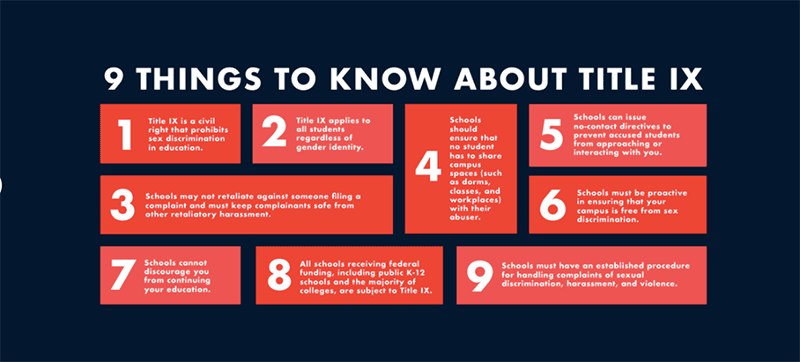Title IX
The District prohibits discrimination, including harassment, against any student on the basis of race, color, religion, sex, gender, national origin, disability, age, or any other basis prohibited by law. The District prohibits dating violence, as defined by this policy. Retaliation against anyone involved in the complaint process is a violation of District policy and is prohibited (FFH Local)
Sexual harassment is defined broadly to include three types of misconduct on the basis of sex, all of which jeopardize the equal access to education that Title IX is designed to protect:
- Any instance of quid pro quo harassment by a school's employee;
- Any unwelcome conduct that a reasonable person would find so severe, pervasive, and objectively offensive that it denies a person equal educational access; (no longer using the TitleVII workplace standard which states severe or pervasive.)
- Any instance of sexual assault (as defined in the Clery Act), dating violence, domestic violence, or stalking as defined in the Violence Against Women Act (VAWA).

Learn more at KNOWYOURIX.ORG
Violence against Women Act (VAWA) Definitions
Dating Violence: Violence committed by a person who is or has been in a social relationship of a romantic or intimate nature with the victim.
- The existence of such a relationship shall be based on the reporting party’s statement and with consideration of the length of the relationship, the type of relationship, and the frequency of interaction between the persons involved in the relationship.
- For the purposes of this definition - Dating violence includes, but is not limited to, sexual or physical abuse or the threat of such abuse. Dating violence does not include acts covered under the definition of domestic violence.
- For the purposes of complying with the requirements of this section and 668.41, any incident meeting this definition is considered a crime for the purposes of Clery Act reporting.
Domestic Violence: A felony or misdemeanor crime of violence committed – by a current or former spouse or intimate partner of the victim
- by a person with whom the victim shares a child in common
- by a person who is cohabitating with or has cohabitated with the victim as a spouse or intimate partner
- by a person similarly situated to a spouse of the victim under the domestic or family violence laws of Maryland, or
- by any other person against an adult or youth victim who is protected from that person’s acts under the domestic or family violence laws of the jurisdiction in which the crime of violence occurred.
Stalking: Engaging in a course of conduct directed at a specific person that would cause a reasonable person to:
- Fear for his or her safety or the safety of others; or
- Suffer substantial emotional distress.
For the purposes of this definition:
- Course of conduct means two or more acts, including, but not limited to, acts which the stalker directly, indirectly, or through third parties, by any action, method, device, or means follows, monitors, observes, surveils, threatens, or communicates to or about, a person, or interferes with a person’s property.
- Reasonable person means a reasonable person under similar circumstances and with similar identities to the victim.
- Substantial emotional distress means significant mental suffering or anguish that may, but does not necessarily, require medical or other professional treatment or counseling.
Lamar CISD's Title IX administrators have attended Eichelbaum Wardell Hansen Powell & Muñoz P.C.'s “New Title IX Rules and Regulations” series. Materials from this series in compliance with Section 106.45(b)(10)(i)(D) of the regulations can be found here: http://www.edlaw.com/materials/new-title-ix-rules-and-regulations-materials.aspx